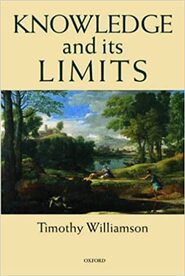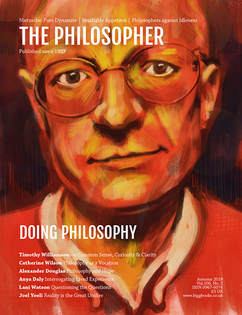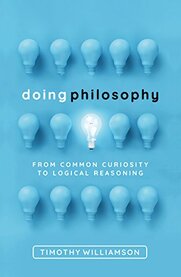In my last post, I kicked off a short series on epistemology books with an overview of Kindly Inquisitors by Jonathan Rauch. I found that one really useful, and I have two other excellent books that I'm itching to explore in this series, but first I feel the need to cover one that I really disliked since I think it's still illustrative of the problems that exist with this topic of knowledge. That book is Knowledge and Its Limits by Timothy Williamson. Williamson is the Wykeham Professor of Logic at Oxford University and he cracked the top 10 in two lists of the most cited philosophers in history, as discussed in a recent blog post by Eric Schwitzgebel. Keen followers might remember that I got to meet Tim in 2018 at a local event when I was asked by The Philosopher to write and present a short review of Doing Philosophy by Williamson. Tim was a most impressive thinker and a very gracious man to interact with four amateur philosophers and our impressions of his work. He obviously has done an enormous amount of good in the field of philosophy so I was excited to dive into his 2002 book on epistemology which sounded by the title like it might agree with my position that we cannot claim to have justified, true, beliefs (the traditional definition of knowledge). As it turned out, however, I think there's a reason Tim is a professor of logic and not one of epistemology.
As before, I'm not going to provide a formal review of this book. I'll just share some selected excerpts that I jotted down and insert a few of my own thoughts and interpretations where necessary. All page numbers are from the 2009 paperback edition from Oxford University Press.
Knowledge and its Limits by Timothy Williamson
- (p.v) If I had to summarize this book in two words, they would be: knowledge first. It takes the simple distinction between knowledge and ignorance as a starting point from which to explain other things, not as something itself to be explained. In that sense the book reverses the direction of explanation predominant in the history of epistemology.
These are the very first sentences in the book, coming in its new Preface, and they explain why one of the blurbs on the back cover said "Williamson is to be commended for turning the theory of knowledge upside down." I didn't immediately grasp what Williamson meant by this, so I kept going through all 300+ pages of the book, but I might just as well have stopped right here. What Williamson is saying is that anything you know...you know! That's it. There's no need to fight over what counts or doesn't count as knowledge. This doesn't actually turn epistemology upside down; it throws it out the window! Williamson takes what is traditionally a normative study of the how's and why's of what we accept as knowledge and he settles for mere bald descriptions and assertions. By the end of the book, it became apparent to me that this is exactly what one might expect from an analytic professor of logic who wants crisp neat lines and unassailable starting points which he can use to build crystal palaces of thought by applying his rigorous formulas. Spoiler alert, that's not the way a gradually transitioning evolutionary world works.
- (p.4) It will be assumed, not quite uncontroversially, that the upshot of that debate [among epistemologists] is that no currently available analysis of knowledge in terms of belief is adequate.
- (p.6) Skeptics and their fellow-travellers characteristically suppose that the truth-values of one’s beliefs can vary independently of those beliefs and of all one’s other mental states: one’s total mental state is exactly the same in a sufficiently radical skeptical scenario as it is in a common-sense scenario, yet most of one’s beliefs about the external world are true in the common-sense scenario and false in the skeptical scenario.
- (p.19) The point about the conjunctive proposition that p is true and unknown is that, in virtue of its structure, it is not available to be known in any case whatsoever. The argument for this conclusion was first published by Fitch in 1963. Contrapositively, he showed that all truths are knowable only if all truths are known. This is sometimes known as the Paradox of Knowability.
Williamson starts by acknowledging the skeptical problem of knowledge. (If you can see it through the jargon.) Philosophers haven't been able to prove that any beliefs rise to the level of true knowledge. Skeptical scenarios can always be imagined which would make our current beliefs false. Therefore, the only way to know if anything is true is to know everything that is possible to know. And it sure seems like that is impossible in a growing and changing universe where we are limited to our subjective viewpoints of the here and now with no way of ever knowing what we don't know.
Sounds pretty irrefutable, right? So what does Williamson offer to combat this?
- (p.21) Knowing is a state of mind. That claim is central to the account of knowledge developed in this book. … A state of a mind is a mental state of a subject. Paradigmatic mental states include love, hate, pleasure, and pain. Moreover, they include attitudes to propositions: believing that something is so, conceiving that it is so, hoping or fearing that it is so, wondering whether it is so, intending or desiring it to be so. One can also know that something is so. This book concerns such propositional knowledge.
- (p.27) Nothing said here should convince someone who has given up ordinary beliefs that they did in fact constitute knowledge, for nothing said here should convince her that they are true. The trick is never to give them up. This is the usual case with philosophical treatments of skepticism: they are better at prevention than at cure. If a refutation of skepticism is supposed to reason one out of the hole, then skepticism is irrefutable. The most to be hoped for is something which will prevent the skeptic (who may be oneself) from reasoning one into the hole in the first place.
The trick?!? So we're just supposed to ignore the centuries of arguments about philosophical doubt? Williamson wants us to confine ourselves to "propositional knowledge." But this is the kind of knowledge that simply takes for granted the propositions that are used to construct a logical argument. For example, take the two propositions A) "Socrates is a man" and B) "all men are mortal." Accept these, and you know for certain that C) "Socrates is mortal." Sure, that's one way to arrive at certainty. But only in "logic space" as opposed to reality. Logic space tells us nothing about how to evaluate the truth of the propositions. And without that, then any old proposition will do. If we were to accept the norm of taking propositions for granted, then we would slide immediately into a vicious relativism where anything can be claimed as true. I'm sure Williamson doesn't want that, but as soon as he gets off his perch and gets into debates about which propositions are to be disallowed, then he's going to need traditional epistemology. Only that can tell you why a proposition such as "all men are not mortal" should be treated as false.
- (p.34) The main idea is simple. A propositional attitude is factive if and only if, necessarily, one has it only to truths. Examples include the attitudes of seeing, knowing, and remembering. Not all factive attitudes constitute states; forgetting is a process. Call those attitudes which do constitute states stative. The proposal is that knowing is the most general factive stative attitude, that which one has to a proposition if one has any factive stative attitude to it at all.
This proposal from Williamson isn't simple at all! Cutting through the dense obfuscation, he has simply smuggled in the claim to know "truths" while ignoring the entire debate about how we know which truths are true. (Spoiler alert, we can't say for certain.)
- (p.101) Since it is logically possible for the deer to be behind the rock at one moment and not another, their present-tensed belief may be true at one moment and false at another. By standard criteria of individuation, a proposition cannot change its truth-value; the sentence ‘The deer is behind the rock’ expresses different propositions at different times.
I just want to flag up this point that "a proposition cannot change its truth-value." That's an important part of the definition for truth that must be considered, and it's also a point that I may raise in an article about evolutionary logic some day. For now, just notice the problem of this "standard criteria" in philosophy.
- (p.138) Thus, the reasoning by which they rule out a last-day examination is unsound, for it assumes that knowledge will be retained in trying to refute a supposition on which it would not be retained.
This is a diversion from the epistemological problem of knowledge that I'm concerned with, but it is an example of the narrowness of Williamson's logic-driven approach so I wanted to mention it. I've cut this passage short, but essentially Williamson tries to solve the surprise test paradox by saying, "A ha! Your argument rests on knowing that a test is coming, but since you might possibly forget that knowledge, then your argument isn't fully airtight. Thus, (*pushes up glasses*), I can ignore the paradox." This is utterly pedantic and misses the entire point of the argument. But when logic is your only hammer tool, every problem gets nailed with it. For a more direct treatment, see my own response to this thought experiment.
- (p.180) Uncertainty about evidence does not generate an infinite regress of evidence about evidence about . . .. In order to reflect adequately on one’s evidence, one might need evidence about one’s evidence, and in order to reflect adequately about the latter evidence, one might need evidence about it, and so on. But this regress is merely and harmlessly potential. We cannot in fact realize infinitely many levels of adequate reflection; at best, further reflection enables us to realize finitely many further stages. At some stage, one must rely on unreflective causal sensitivity to evidence.
This is the heart of Williamson's long argument — that one must rely on unreflective causal sensitivity to evidence. No matter how much logical notation he hides behind (and there is a lot of it), this is a stunningly weak point to rest one's epistemology upon. I thought an unexamined life was not worth living. So how is an unreflective philosophy worth listening to?
- (p.184) In recent decades, questions of knowledge seem to have been marginalized by questions of justification. According to Crispin Wright, “knowledge is not really the proper central concern of epistemologico-skeptical enquiry… We can live with the concession that we do not, strictly, know some of the things we believed ourselves to know, provided we can retain the thought that we are fully justified in accepting them.” Similarly, John Earman argues that accounts of knowledge are irrelevant to the philosophy of science, because in it ‘the main concern is rarely whether or not a scientist ‘knows’ that some theory is true but rather whether or not she is justified in believing it’.
That's right. Building cases for justification is good enough for scientists, but that's all our knowledge can ever be as well. It is time for a turn to humble pie in epistemology.
- (p.189) Why does it matter what counts as evidence? Consider the idea that one should proportion one’s belief in proportion to one’s evidence for it. How much evidence one has for the proposition depends on what one’s evidence is. More precisely, a theory of evidence is needed to give bite to what Carnap calls the requirement of total evidence: “[I]n the application of inductive logic to a given knowledge situation, the total evidence available must be taken as a basis for determining the degree of confirmation (1950: 211).”
This is another excellent point to consider. We need a theory of evidence for determining degrees of confirmation. Sounds like a job for another evolutionary hierarchy! Not one of needs or of consciousness or of free will, but one of knowledge. I'll be working on that for sure for my paper to come out of all this research.
And with that, I've reached my limit on Knowledge and Its Limits. Let me know if you have any other questions or thoughts about it in the comment section below. Until next time, merry Christmas! Hope you liked pressing on this lump of coal as we try to make diamonds with clarity.




